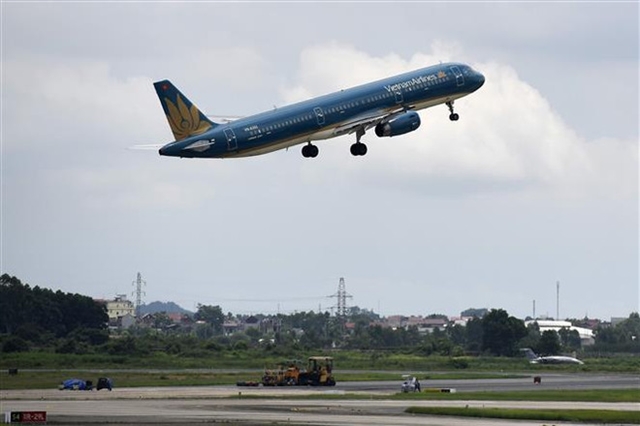The national flag carrier has previously urged authorities to increase the existing fare cap while awaiting legal revisions, viewing this as a temporary solution that would allow airlines to adjust pricing across domestic routes effectively.

HÀ NỘI Vietnam Airlines has proposed revisions to the draft Law on Civil Aviation of Việt Nam, calling for the removal of airfare caps and priority access to take-off and landing slots for the national flag carrier.
In its latest feedback on the draft law, the airline argued that eliminating the maximum airfare ceiling would give carriers greater autonomy and flexibility in responding to market dynamics. Vietnam Airlines has repeatedly raised the issue, with renewed strength since the COVID-19 pandemic.
The carrier has previously urged authorities to increase the existing fare cap while awaiting legal revisions, viewing this as a temporary solution that would allow airlines to adjust pricing across domestic routes effectively.
Airfare cap still in place
Currently, maximum airfares are governed by the Law on Prices. The Ministry of Construction, which has been tasked with overseeing the draft law, said that domestic passenger air transport remains an essential service subject to State price management under Point d, Clause 1, Article 21 of the law.
According to the ministry, airfare ceilings fall within the category of goods and services for which the State sets maximum prices to ensure public accessibility and prevent price manipulation in a market dominated by a few large players.
Despite having six airlines operating on domestic routes, Vietnam Airlines and Vietjet Air hold the vast majority of the market. This structure, the ministry said, requires the application of both price ceilings and price floors to prevent abuse of market power.
Associate Professor Dr Ngô Trí Long said that, under current law, when a business dominates a market, the State must set a price ceiling to protect consumers. Conversely, when a buyer dominates, a price floor is needed to ensure fair payment to sellers.
“In Việt Nam's domestic aviation market, the dominant positions of Vietnam Airlines and Vietjet Air justify the government's use of a price framework,” Long said.
“This prevents dominant players from inflating prices or undercutting competition in ways that could harm consumers.”
Preferential treatment
In addition to fare policy changes, Vietnam Airlines is also seeking preferential treatment in airport slot allocations. Specifically, the airline is proposing that the revised laws grant “priority access to slots for the national flag carrier.”
Responding to this particular request, the ministry said the proposal would be considered during the drafting process, guided by international best practices and conditions in Việt Nam.
As of now, the term 'national airline' carries political and strategic recognition, but its definition and associated privileges vary globally. The ministry noted that the criteria for national carrier status are evolving alongside the development of global air transport and domestic socio-economic conditions.
Any special policy regarding slot allocation for a national airline would need to be detailed in the implementation decrees that accompany the revised law. The ministry also stressed that future slot allocation policies would aim to maximise airport capacity and avoid resource waste, especially as the country aims to expand its airport infrastructure.
Industry experts have previously warned that preferential slot access could distort competition. They pointed out that prime-time slots, early morning and evening, can make or break an airline’s profitability, as these timeframes attract the highest passenger demand.
According to the ministry, the current Law on Civil Aviation, in force for nearly two decades, has helped Việt Nam meet international standards in aviation safety and oversight. It has enabled Vietnamese airlines to access major global markets such as North America and Europe. The country is now considered a regional competitive player in aviation safety oversight, recognised by international organisations for its capabilities.
However, the existing law still has gaps. It lacks specific provisions on the roles and responsibilities of aviation authority leaders, and does not separate accident investigation functions from regulatory oversight. Additionally, the roles and powers of aviation safety inspectors are not clearly defined. To address these shortcomings and align Việt Nam's legal framework with international norms and industry needs, the law must undergo a comprehensive revision. VNS





